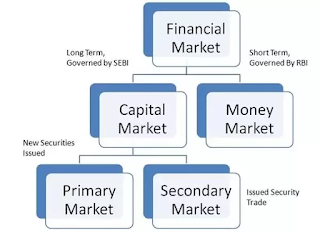Concept And Meaning Of Financial Market
Financial Market refers to a marketplace, where creation and trading of financial assets, such as shares, debentures, bonds, derivatives, currencies, etc. take place. It plays a crucial role in allocating limited resources, in the country’s economy. It acts as an intermediary between the savers and investors by mobilizing funds between them.
ALSO READ: Company Fixed Deposit: Meaning, Advantages and DisadvantagesTYPES OF FINANCIAL MARKETS
Within the financial sector, the term "FINANCIAL MARKETS" is often used to refer just to the markets that are used to raise finance: for long term finance, the CAPITAL MARKETS; for short term finance, the MONEY MARKETS
Other types of Financial market include:
1. Stock Markets: Stock Market is a type of Capital market which deals with the issuance and trading of shares and stocks at a certain price.
2. Bond Markets: Bond Market is a form of capital market where buyers and sellers are involved in the trading of bonds.
3. Commodity Market: A market which facilitates the sale and purchase of raw goods is called a commodity market. Commodity market like any other market includes a buyer and a seller. In such a market buyer purchases raw products like rice, wheat, grain, cattle and so on from the seller at a mutually agreed rate.
4. Money Market: As the name suggests, money market involves individuals who deal with the lending and borrowing of money for a short time frame.
5. Derivatives Market: The market which deals with the trading of contracts which are derived from any other asset is called as derivative market.
6. Future Market: Future market is a type of financial market which deals with the trading of financial instruments at a specific rate where in the delivery takes place in future.
7. Insurance Market: Insurance market deals with the trading of insurance products. Insurance companies pay a certain amount to the immediate family members of owner of the policy in case of his untimely death.
8. Foreign Exchange Market: Foreign exchange market is a globally operating market dealing in the sale and purchase of foreign currencies.
9. Private Market: Private market is a form of market where transaction of financial products takes place between two parties directly.
10. Mortgage Market: A type of market where various financial organizations are involved in providing loans to individuals on various residential and commercial properties for a specific duration is called a mortgage market. The payment is made to the individual concerned on submitting certain necessary documents and fulfilling certain basic criteria.
ALSO READ: Capital Market: Meaning, Functions And Objectives
FUNCTIONS OF FINANCIAL MARKETS
INTERMEDIARY FUNCTIONS: The intermediary functions of financial markets include the following:
- Transfer of resources: Financial markets facilitate the transfer of real economic resources from lenders to ultimate borrowers.
- Enhancing income: Financial markets allow lenders to earn interest or dividend on their surplus invisible funds, thus contributing to the enhancement of the individual and the national income.
- Productive usage: Financial markets allow for the productive use of the funds borrowed. The enhancing the income and the gross national production.
- Capital formation: Financial markets provide a channel through which new savings flow to aid capital formation of a country.
- Price determination: Financial markets allow for the determination of price of the traded financial assets through the interaction of buyers and sellers. They provide a sign for the allocation of funds in the economy based on the demand and to the supply through the mechanism called price discovery process.
- Sale mechanism: Financial markets provide a mechanism for selling of a financial asset by an investor so as to offer the benefit of marketability and liquidity of such assets.
- Information: The activities of the participants in the financial market result in the generation and the consequent dissemination of information to the various segments of the market. So as to reduce the cost of transaction of financial assets.
- Providing the borrower with funds so as to enable them to carry out their investment plans.
- Providing the lenders with earning assets so as to enable them to earn wealth by deploying the assets in production debentures.
- Providing liquidity in the market so as to facilitate trading of funds.
- Providing liquidity to commercial bank
- Facilitating credit creation
- Promoting savings
- Promoting investment
- Facilitating balanced economic growth
- Improving trading floors











